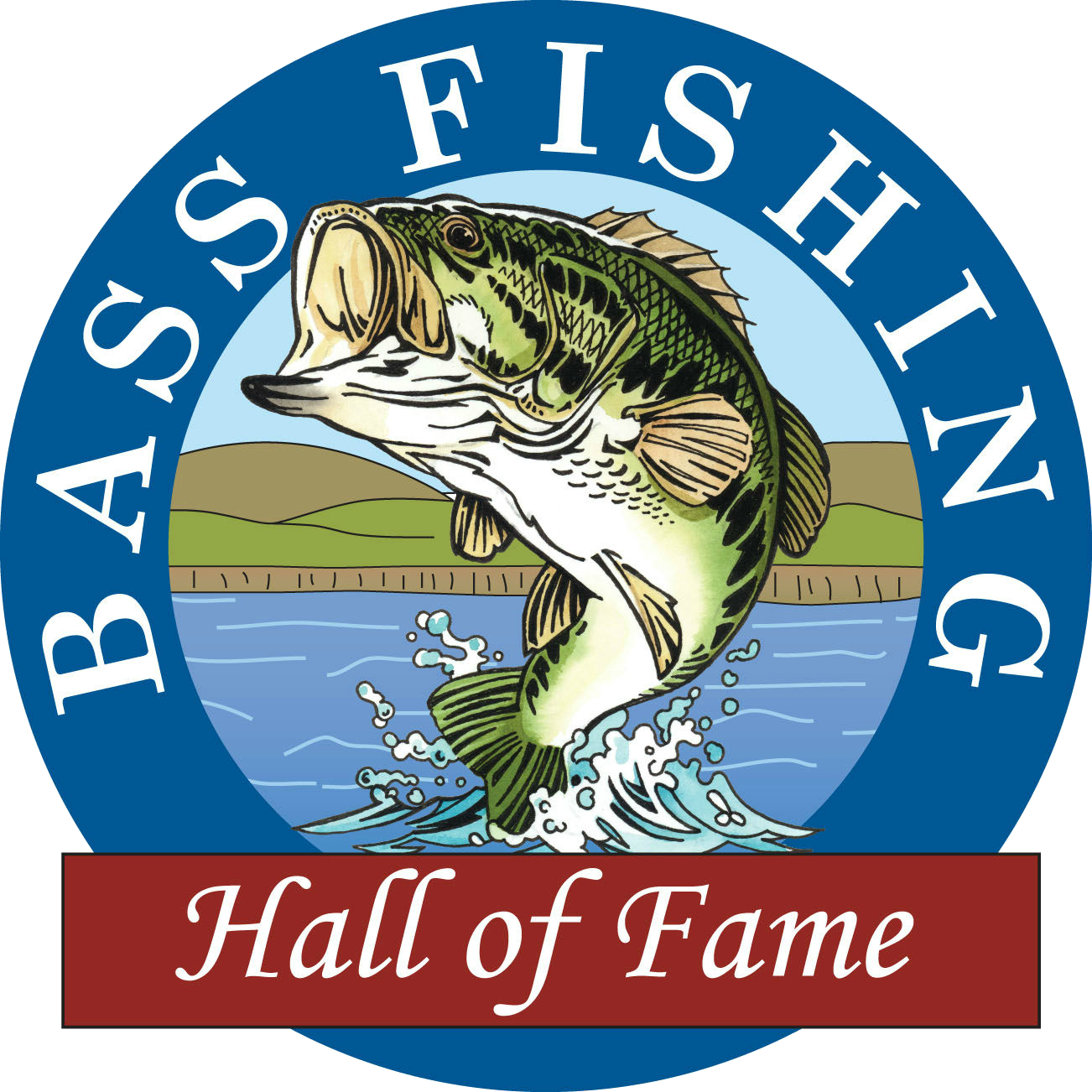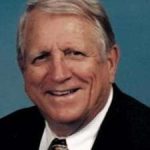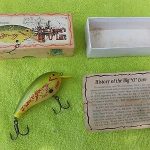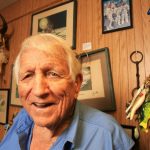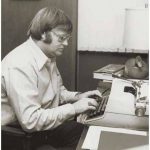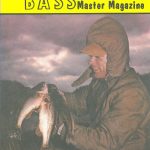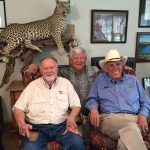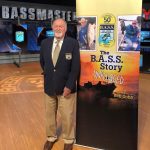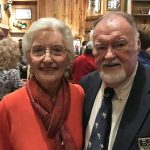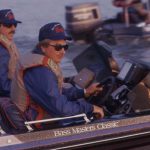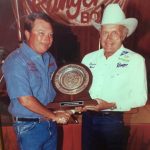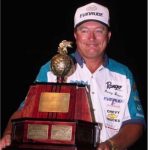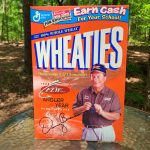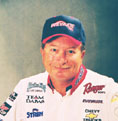Johnny Morris
While he cut his fishing teeth in the state of Missouri as a youngster, Johnny Morris has proven that he can catch ’em anywhere he goes, around the world. During a very distinguished professional bass tournament career, he proved that he could “cast” with the best of them, when he competed along the B.A.S.S. tournament trail, during the early to mid-seventies. He qualified for five BassMaster Classics, during his professional tenure.
It’s not his contribution as a professional angler that brings him into this distinguished class, but his business skills. Johnny Morris has perhaps done more to assist anglers by providing quality fishing tackle, at affordable prices, than any single person in the history of the sport.
In 1971 he decided that he was tired of not being able to get a variety of fishing tackle at his local bait shops, so he did something about it. He cosigned an inventory loan with his father and set up a small, eight-foot tackle display in the back of his father’s “Brown Derby” liquor store. This wasn’t just any liquor store, on just any ole street corner. This was the most successful chain of liquor stores in the state of Missouri. With his successful father’s entrepreneurial sense of business savvy, a deep love and respect of the outdoors, and a desire to provide anglers everywhere with high quality fishing tackle at prices anyone could afford, the start of the now world famous “Bass Pro Shops” began in very humble surroundings.
His father also took the time to take him hunting, fishing and to teach him to respect and appreciate the outdoors.
His fish catching abilities were starting to get noticed by everyone around the central Ozarks region of the country. It was these fish catching skills that would aid him in selecting just the right lures to sell in his small, fledgling, tackle business.
By early 1974, the reputation of his tackle shop had grown to such a point that anglers who had traveled through Springfield, Missouri, and shopped with him, would often call back, placing orders for more lures, over the telephone. Sensing the need for a larger distribution network convinced this man to produce his first, 180-page catalog with about 1,500 items in it.
Today, that same “Bass Pro Shops” catalog is produced as both seasonal publications and a Master catalog. In all, more than 30,000 items can be found in today’s “Bass Pro Shops” catalogs, that are shipped to more than 34-million sportsmen. The success of the catalogs spawned two additional catalogs…one for saltwater anglers called: “Offshore Angler” and one filled with hunting gear called: “The Redhead” catalog. Regardless of your outdoor interest, this man has probably produced a catalog for your needs!
Before today’s mass produced, and mass marketed, fishing boats became mainstream, he saw a need for fishermen to be able to go to one location and purchase a fully-rigged, “fish ready” outfit.
“Tracker Marine” and “Bass Tracker” were formed. A move that proved to be both profound and profitable. Today, “Tracker Marine” entails a number of fishing boats, pontoon boats, houseboats, saltwater boats, and the high performance fiberglass bass boat “Nitro”.
By the early 1980’s “Bass Pro Shops” catalog had grown so large that thousands of anglers longed to have a place to shop for the same tackle that they were seeing on the pages of “Bass Pro” catalogs. Sensing a need in the marketplace, Mr. Morris created a place “where angler’s can meet and greet”. A wonderland for every fishing, camping, hunting or outdoor need that a person might have. In 1981, the now world-renowned “Bass Pro Shops-Outdoor World” opened it’s doors in Springfield, Missouri. A location that has grown to more than 4 million visitors a year and is the single largest tourist attraction in the state of Missouri, and one of the top 10 in America.
Johnny Morris’ accomplishments include: the world-class “Big Cedar Lodge”, on Table Rock Lake, south of Branson, Missouri; his “Top of the Rock”, Jack Nicklaus designed golf course, adjacent to “Big Cedar Lodge”. The 10,000 acre wilderness area he created: “Dogwood Canyon”.
He has been awarded the “President’s Award” from the International Association of Fishing and Wildlife Agencies, along with serving for six years on the Board of Directors for the National Fish and Wildlife Foundation, three of which he served as Chairman. He received the “Teddy Roosevelt Conservationist Award”, from former president George Bush and in 1992 was elected into the Sport Fishing Hall of Fame.
Johnny Morris
He began his fishing career, it seems, while still in diapers. After all, we’ve been watching him on television for over twenty-five years. To get a TV. show of his own, he had to be able to catch a bass. And, catch ’em he can.
Jimmy Houston won his first professional bass tournament in 1966. In 1968, he began fishing the B.A.S.S. tournament trail. Something he continues, even today.
His first tournament on the B.A.S.S. circuit certainly proved that he could “stick with the big boys”, when he finished in sixth place at Lake Eufaula, Alabama. A performance that was simply a “forecast of things to come”. As his tournament record started to grow, so did the thousands of fishing fans who came to watch him weigh-in his fish, tell a joke, give fishing advice, or simply discuss bass fishing with him. He has been, and continues to be, one of the most popular anglers ever. Plus, he’s easily one of the most recognizable anglers to ever wet a hook. With his boyish looks, his trademark Moe Howard haircut, and that unforgettable giggle, this man is someone whom you both enjoy being around and learning from at the same time.
Personality aside, this man catches bass and lots of them. In 1976 he won his first B.A.S.S. “Angler-of-the-Year” title, and followed it up with another B.A.S.S. “Angler-of-the-Year” title in 1986. Along the waterways of America, he has acquireded two national B.A.S.S. tournament victories, he’s placed in the money an astounding 50% of the time he’s competed and has won over $400,000 dollars along the B.A.S.S. and Wal*Mart FLW Tours.
Jimmy Houston has also produced one of the most popular television programs of all time, for more than twenty-five years, and his “Jimmy Houston Outdoors” television show is seen each week on ESPN2 by more than 73 million viewers.
In addition, he is a great businessman. His many “Jimmy Houston Outdoors” marine dealerships have proven to be the “in spot” to purchase boats, in every community he’s opened one and the number of dealerships that he owns continues to grow!
Jimmy Houston
Known affectionately as “pawpaw” (he is a grandfather), it was his mild demeanor and years of giving fatherly advice to tournament fishermen across America that gained him this name with hundreds of tournament pros.
Guido Hibdon, while having fished all of his life, came to the national fishing public’s attention, when he won the first B.A.S.S.. tournament he ever competed in, on Lake of the Ozarks, Missouri, in 1980. This, however, was only the beginning of a storied career for this outstanding angler.
While growing up in the mountains of central Missouri, he became known as one of the best hunters and fishermen to ever go in search of his prey. Growing up in a family that was the first to guide on Lake of the Ozarks had a little something to do with it.
Early on, he learned to make fishing lures for a living. Not as a business, but out of necessity.
Since he began his professional tournament career, in 1980 he has collected awards and achievements second to none. In 1988 he won one of the toughest BassMaster Classics ever held, by capturing the title on the James River, outside of Richmond, Virginia, with a three day total of 28 pounds, 8ounces.
What made this victory so much sweeter, was the fact that, for three days, he had a captive audience of dozens of spectator boats following him up the tiny Appomattox River. Anyone who has seen the television coverage of this event knows what it meant. At this same event, his son, Dion, was also making his first BassMaster Classic appearance. A father/son combination that has only been accomplished one other time during B.A.S.S.. history and a Classic title that his son would also capture a few years later.
However, fishing under tough conditions proved to be his forte. In 1990 and 1991, he captured the coveted B.A.S.S.. “Angler of the Year” title. A “back-to-back” feat that has only been done twice throughout the history of the Bass Anglers Sportsman Society’s tournament trail. Once, by the legendary angler Roland Martin.
It was this man’s uncanny ability to catch bass in gin-clear lakes, on small, four-to-eight pound test lines, that have become the stuff that legends are made of. He is credited with catching more bass over ten pounds, on light line, than most people have ever caught on any size of line. He’s designed some of the greatest bass lures ever created, for Gambler Lure Company. Baits like the “Guido Bug” and the “Guido’s Original”.
And, just to prove that, in his mid-fifties, he still has the “right stuff”, he finished in 4th place in last year’s Wal*Mart FLW Tour “Angler of the Year” race.
Guido Hibdon
Cotton Cordell (1928—2015) When Cotton Cordell was just a kid, his father owned a boat landing on Lake Catherine, in Hot Springs, where he cut his teeth on fishing, guiding, and lure designing.
After World War II, he discovered that, by purchasing survival kits that had been stowed on military aircraft, he would get a knife, a razor, twine, bandages, and a bucktail jig, made with white-tail deer hair. It was the jig that caught his attention.
When war survival kits became scarce, he learned to improvise by using hair from his English Setter. “Dog hair will catch just as many fish as deer hair. But before it was over, I had the baldest English Setter in the world”. Quite an inauspicious beginning for sure and one that led Cordell to form his own lure company when the demand for his jigs outgrew his ability to make them in the bathroom of his small bait and tackle shop.
By the time he sold Cordell lures in 1980, he had designed or obtained marketing rights to lures that are still produced by the millions and have become household names. He bought the rights to make and sell a plastic version of Fred Young’s wooden “Big O” crankbait and helped launch the “alphabet crankbait craze.”
Once a fishing lure designer, always a fishing lure designer. His office was literally carpeted with dozens of wood carvings of prototype lures and hand-shaved plastic molds that he knew one day would help everyone catch more fish.
Cordell was elected into the National Freshwater Fishing Hall of Fame in 1987, and into the Arkansas Outdoor Hall of Fame a few years later. He was a past Board of Directors Member of the Ouachita Baptist University and an Honorary Member of the National Fishing Lure Collectors Club.
Cotton Cordell
Bob Cobb — While Ray Scott gets much-deserved credit as the father of modern bass fishing, the keenest observers of those early years of Scott’s B.A.S.S. organization agree that the movement probably would not have survived without the relentless efforts and creative genius of Bob Cobb.
Cobb, the outdoor editor of the Tulsa Tribune in 1967, when Scott was organizing his first professional bass tournament at Beaver Lake, Arkansas, not only covered the first media event, but he also used his newspaper column to help recruit enough anglers to make the tournament a success. Without that boost, Scott acknowledges, the All-American Bass Tournament would have been dead in the water.
After editing and publishing the first few issues of the membership magazine, Bassmaster, Scott knew he needed a professional to steer the publication. Bob Cobb was the obvious choice. Most periodicals of that day used outdoor writers as the experts in how-to stories and armchair adventures. Cobb turned that model on its head. Instead, he milked the minds of tournament anglers to create cutting-edge content about bass fishing.
“A bass tournament was like a laboratory,” Cobb often said. “There was a big funnel, and everybody who came in with fish poured some knowledge into the funnel, and out dripped how-to information that went straight onto the pages of Bassmaster.”
“Bob was not publishing pretty stories about how beautiful the sun was at daybreak,” said Harold Sharp, the first B.A.S.S. tournament director. “He was telling it like it is, and he knew when a story was real or not because he was a good bass angler himself.”
The formula worked, and immediately, membership in the Bass Anglers Sportsman Society grew past 9,000 and Ray Scott’s dream was becoming a reality.
Cobb was instrumental in the success of numerous other initiatives that helped gain momentum for B.A.S.S. He and Scott conceived the Bassmaster Classic, which would mushroom into the “Super Bowl of Bass Fishing” and the most important event in sportfishing.
He steadily won over outdoor journalists who were opposed to competitive fishing, in large part by inviting them to fish alongside the Classic contenders as “press anglers” and observers. When B.A.S.S. created the Bassmaster Seminar Circuit, which featured top pros like Roland Martin and John Powell sharing their fish-catching secrets, Cobb’s knack for creating advance publicity ensured packed houses in auditoriums in major cities across the country.
B.A.S.S. also made a name for itself by taking on industrial polluters that were discharging poorly treated wastewater into rivers and lakes. After the organization filed a round of lawsuits under the 1899 Federal Refuse Act, Cobb’s public relations campaign brought America’s water quality crisis to the attention of the non-fishing public and garnered coverage on national television news programs.
“He created enough press that finally the government formed the EPA (Environmental Protection Agency) to try to put a stop to this problem,” recalled Sharp. The crusade solidified B.A.S.S. as a conservation-oriented organization dedicated to improving aquatic resources across the country.
Through his dual roles as editor of Bassmaster and publicity director for B.A.S.S., Cobb made household names out of some of the leading anglers of the day. Bill Dance, Tom Mann, Bobby Murray, along with Martin, Powell and many others were able to line up sponsors and parlay their fishing abilities into lucrative careers, thanks in large part to the promotion Cobb gave them.
Between 1969 and 1984, Cobb edited more than 150 issues of Bassmaster — some swelling to more than 200 pages — as well as numerous how-to books and special magazine issues. His magazine so dominated the world of fishing journalism that Time Magazine labeled Bassmaster “the Bible of Bass Fishing.”
After 16 years at the helm of Bassmaster, Cobb launched a second career, this time in television. Again, he was a pioneer in his chosen field.
With a background of producing annual “movies” built around the Bassmaster Classics, Cobb took over as creator, producer, director, writer and sometime host of “The Bassmasters” TV show, which debuted in 1984 on TNN — The Nashville Network. It was the first television series built around competitive bass fishing, and it was an almost instant hit.
As the highest-rated program on TNN, “The Bassmasters” further drove attention to the sport of professional bass fishing, increased membership in B.A.S.S. and lured major national sponsors and advertisers in the automotive, petroleum and insurance industries to the sport.
Now living in Atlanta, Cobb continues to be active in the bass fishing community, appearing at major B.A.S.S. events and promoting his 412-page opus, The B.A.S.S. Story — Unplugged. The richly illustrated coffee-table book chronicles the birth of modern bass fishing and solidifies Cobb’s remarkable role in the movement.
- The Bassmaster Magazine debuted with the Spring 1968 issue
- Sevier with Bob Cobb at the 208 HOF Induction Banquet
Bob Cobb
DENNY BRAUER (1949—) – Nebraska native Denny Brauer left a career as a brick mason to uproot his family to Missouri to chase his dream of becoming a professional angler, and went on to become the most notable flipper and pitcher in bass fishing history. Building on the legacy of innovators like 2007 inductee Dee Thomas, Brauer went on to reach the pinnacle of the sport, earning not just Bassmaster and FLW Angler of the Year titles but also the 1998 Bassmaster Classic trophy.
After being introduced to a copy of Bassmaster Magazine by a co-worker, Brauer started competing with the Blue Valley Bass Club of Seward Nebraska, and worked himself up through the ranks of the B.A.S.S. Nation. Two years after he competed in the 1978 B.A.S.S. Nation Championship in Alabama, the professional circuit visited his adopted home waters, the Lake of the Ozarks, and he decided to enter. The resulting 20th place finish and $1,000 check were the gateway to a career that spanned the better four decades and left an indelible impression on the rise of one of the sport’s most deadly techniques.
Lake of the Ozarks played a crucial role in his success. The lake was extremely fertile in the 1980s and offered a wide variety of cover and structure, but its countless boat docks were of particular note – they led him to become a proficient and devoted jig flipper, which became his calling card. He guided both there and on the newly-impounded Truman Reservoir and built up an encyclopedia of techniques and trips through his hours on the water.
Brauer went on to win 17 B.A.S.S. tournaments, the first in 1984 and the last in 2011, on the way to accumulating over $2.5 million dollars in earnings from that circuit. Those victories included not just regular season events, but also the 1987 Super Invitational on Kentucky Lake, the 1992 Megabucks on Guntersville, the 1993 SuperStars on the Illinois River, and of course the 1998 Bassmaster Classic on High Rock Lake. He competed in a total of 21 Classics, and finished in the top 10 in eight of them. During his Classic victory he factored in the knowledge that spectator traffic might hinder his shallow water flipping pattern and specifically sought out areas where boat traffic and boat wakes would not impact his targets.
In addition to B.A.S.S. events, Brauer also fished all or part of seven FLW Tour seasons, qualifying for five Forrest Wood Cups, and adding another quarter of a million dollars to his career earnings. The same year that he won the Classic he also won the FLW Tour Angler of the Year award, and became the first angler to be featured on the Wheaties cereal box, joining other champions including Michael Jordan and Tiger Woods.
Long after his time on the FLW Tour ended in 2003, he continued to compete in FLW Outdoors events, mostly in Texas, and in 2014 he won a Toyota Series tournament on Toledo Bend, beating a best-of-the-best field of local and national talent.
His success made him a polished and highly-desirable seminar speaker, and also led to two appearances on the The David Letterman Show. On the first one, he was there with Ozzy Osbourne and proceeded to give the rock and roll legend an impromptu casting lessons on a New York City street. He was also the host of a popular show called The Bass Class on ESPN2.
Over the course of his lengthy career, Brauer developed numerous long-term sponsor relationships, most notably with Ranger Boats and Strike King Lure Company, and his name was affixed to countless “signature” products. His Bassmaster Classic victory was instrumental in introducing the flipping tube to a wide audience – before that it had been a closely-guarded secret of a handful of pros.
He also raised a fellow B.A.S.S. champion. His son Chad qualified for three Bassmaster Classics and won a 1996 Bassmaster Top 100 on Old Hickory Lake and a 2010 Bassmaster Central Open on the Red River.
Denny Brauer was inducted into the Bass Fishing Hall of Fame in 2002.
